DEFIANCE OF THE PATRIOTS
DEFIANCE OF THE
PATRIOTS
THE BOSTON TEA PARTY & THE MAKING OF AMERICA

 BENJAMIN L. CARP
BENJAMIN L. CARP 
YALE UNIVERSITY PRESS
NEW HAVEN AND LONDON
Published with assistance from the Annie Burr Lewis Fund
Copyright 2010 Benjamin L. Carp
All rights reserved. This book may not be reproduced in whole or in part, in any form (beyond that copying permitted by Sections 107 and 108 of the U.S. Copyright Law and except by reviewers for the public press) without written permission from the publishers.
For information about this and other Yale University Press publications, please contact:
U.S. Office: sales.press@yale.edu www.yalebooks.com
Europe Office: sales@yaleup.co.uk www.yaleup.co.uk
Set in Adobe Caslon by IDSUK (Data Connection) Ltd
Printed in Great Britain by TJ International Ltd, Padstow Cornwall
Library of Congress Cataloging-in-Publication Data
Carp, Benjamin L.
Defiance of the patriots: the Boston Tea Party and the making of America / Benjamin L. Carp.
p. cm.
ISBN 9780300117059 (cl:alk. paper)
1. Boston Tea Party, 1773. 2. Boston (Mass.)HistoryColonial period, ca.16001775. 3. Sons of Liberty. 4. East India CompanyHistory18thcentury. 5. United StatesHistoryRevolution, 17751783Causes. 6. Great BritainColoniesAmericaHistory18th century. I. Title.
E215.7.C37 2010
973.3'115dc22
2010019703
A catalogue record for this book is available from the British Library.
10 9 8 7 6 5 4 3 2 1
For Jessica
Contents
Illustrations and Maps
Illustrations
Maps
Acknowledgments
Thanks to Heather McCallum for asking a great question, and thanks to Frank Cogliano for recommending me as a person who could answer it. I am also grateful to Rhodri Jeffreys-Jones and Alvin Jackson for their early advice. Thanks to Sydelle Kramer, literary agent, for helping me to craft a convincing proposal. Wayne E. Lee, David Waldstreicher, and numerous unnamed scholars provided valuable feedback at the proposal stage.
This book is dedicated to my wife Jessica, who made this book possible in countless ways, and life wonderful in countless others. She read an early draft of the entire manuscript and offered wise critiques. I am also indebted to J. L. Bell, my late father Robert Carp, Frank Cogliano, Peter S. Onuf, Ray Raphael, and Alfred F.Young, who each read a subsequent draft of the manuscript in full. Their responses, coupled with recommendations from Heather McCallum and Rachael Lonsdale of Yale University Press, led me to make extensive revisions, all of which improved the manuscript enormously. Thanks also to Tami Halliday, Stephen Kent, Liz Pelton, and Jessica Lee.
I am grateful for my Tufts University colleagues, including former colleagues, particularly in the Department of History. I have been fortunate to land in such a congenial, supportive environment, and I also deeply appreciate the profound ways in which my colleagues' approaches to history and scholarship helped to shape this book. Tufts University provided me with a year of junior faculty research leave, as well as two Faculty Research Fund Awards, which were vital in enabling me to complete the manuscript. Thanks to Patrick Florance of the GIS Center at Tufts for his work on the maps, as well as Tufts students Rian Amiton, Jonathan Gale, Simcha Levental, and Natalie Susmann.
Martha R. Simms, who graduated Tufts in 2009, worked with me as part of the Tufts Summer Scholars Program, helping to compile information on the Tea Party participants. Molly Palmer, who received her M.A. from Tufts in 2009, assisted me further to compile data on the Tea Party participants, as well as other sources. She and Alexandra Mulrow, a current M.A. student at Tufts, also helped me to locate the book's images and put finishing touches on the manuscript. Without research assistance from these three promising students, I could not have finished. I am grateful to each of them. I taught a seminar course, Massachusetts and the American Revolution in the spring of 2007 and then again in spring 2008. In the process of writing papers for the course, these students revealed some remarkable insights and sources. Although I was not able to include all of their contributions, I have cited many of the students' names at points in the text where their research aided my own.
I enjoyed exchanging inquiries with J. L. Bell and Alfred F. Young about Revolutionary Boston and its inhabitants; I can't overstate their kindness toward me or their influence on me as scholars. I would also like to offer my warmest thanks to George A. Quintal Jr., an impressive researcher who generously shared with me some of the information from his extensive data-base of Boston Tea Party participants. Sarah Neale Fayen, Ethan Lasser, and Jonathan Prown of the Chipstone Foundation graciously hosted me on a trip to Milwaukee in December 2008. Thanks also to Elizabeth Ammons, Ina Baghdiantz-McCabe, Mary C. Beaudry, Russ Castronovo, John Catanzariti, Sarah Clock, Radiclani Clytus, Felipe Fernndez-Armesto, Evan Haefeli, David Jaffee, Samuel Kinser, Tsong-han Lee, Michelle Craig McDonald, Maurie McInnis, Meghan McMahon, Jane T. Merritt, Francesca Morgan, Kate Ohno, Nathan Perl-Rosenthal, Linda Smith Rhoads, Jessica Sewell, John Stauffer, Beverly Tomek, John W. Tyler, Jennifer Van Horn, and Karin Wulf, who shared their work, pointed the way to useful resources, or helped me to locate sources at a distance. Special thanks to Woody Holton for motivating me to think about protests past and present.
I am grateful to Paul Grant-Costa, Daniel Mandell, and Kris Manjapra, each of whom read manuscript chapters, for their valuable insights. Thanks also to C. James Taylor and the other participants in the MHS-sponsored Boston Area Early American History Seminar, hosted by Alan Rogers at Boston College in May 2008; and to Karen Kupperman's Atlantic World Workshop at New York University in December 2008. I presented some of my research at Cities in Revolt: The Dutch-American Atlantic, ca.16501830, a conference at Columbia University in November 2009. Thanks to Ned Landsman and Peter Silver in particular for their remarks. I was also grateful for responses from audiences at the thirteenth annual meeting of the Omohundro Institute for Early American History and Culture in June 2007; the Exploring Transnational Studies Inaugural Conference at Tufts University in April 2009; the Summer Seminar Series of the McNeil Center for Early American Studies in June 2008; the Cronin Lecture Series at the Lexington Historical Society in November 2008; and the Middays at the Meeting House series at the Old South Meeting House in December 2009.
One can never be too thankful for librarians and museum curators; many thanks to the staffs of the institutions who provided images or facilitated access to their archives. I neglected to take names at all the places I went, but I will offer thanks in particular to Diann Benti and Paul Erickson at the American Antiquarian Society; Adele Barbato, Nicole DeLaria, Rainey Tisdale, and Marieke Van Damme at the Bostonian Society and Old State House; John W. Hooper at the Boston Public Library; Katherine A. Ludwig and Meg McSweeney at the David Library of the American Revolution; Katherine Fox, Laura Linard, and Tim Mahoney of the Baker Library, Harvard Business School; Dana Ste. Claire of Historic Tours of America for giving George Quintal permission to share some of his data with me; Cynthia Alcorn of the Samuel Crocker Lawrence Library at the Grand Lodge of Massachusetts; Anne Bentley, Anna Cook, Caitlin Corless, Jeremy Dibbell, Peter Drummey, Elaine Grublin, and Conrad E. Wright at the Massachusetts Historical Society; Elizabeth Bouvier and Bruce Shaw of the Massachusetts Supreme Judicial Court; Thomas Lannon and Jessica M. Pigza of the New York Public Library; Emily Curran, Robin DeBlosi, and Aliza Saivetz at the Old South Meeting House; Dan Finamore and Carrie Van Horn at the Peabody Essex Museum; Joan Gearin at the National Archives in Waltham, MA, and Rodney A. Ross of the Center for Legislative Archives in Washington, DC; Peter J. Knapp of the Watkinson Library at Trinity College, Connecticut; and Connie Reik of the Tisch Library at Tufts University. Eric Foner once again facilitated a year of access to the libraries of Columbia University.
Next page
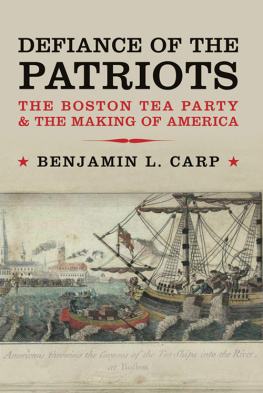
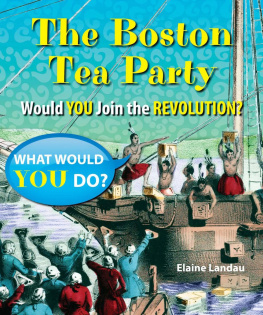
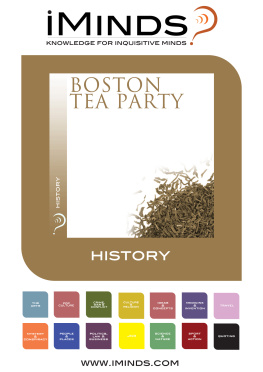
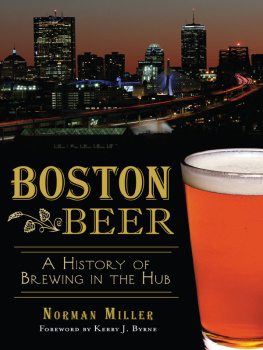
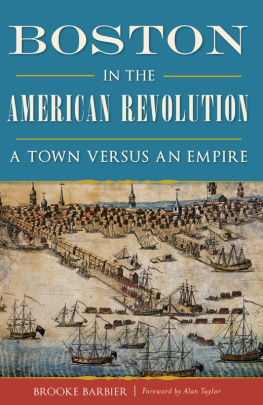
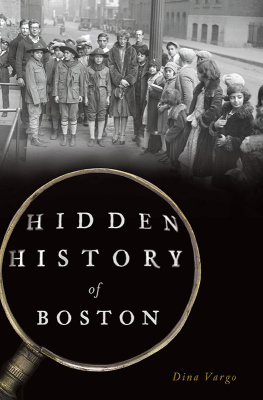

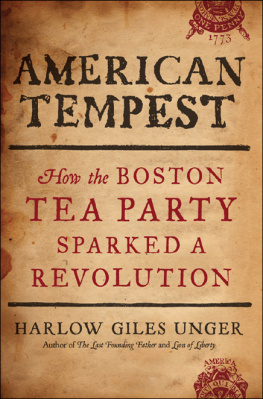
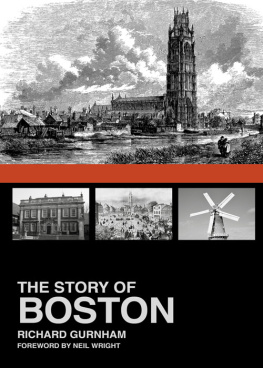
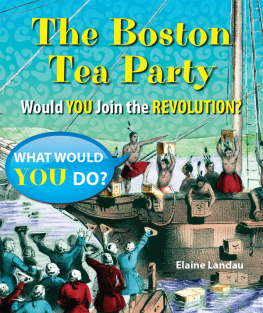

 BENJAMIN L. CARP
BENJAMIN L. CARP